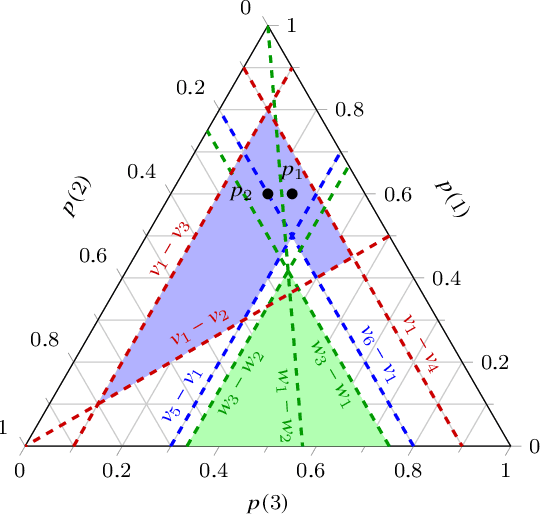Alexander Erreygers
A decision-theoretic approach to dealing with uncertainty in quantum mechanics
Mar 26, 2025Abstract:We provide a decision-theoretic framework for dealing with uncertainty in quantum mechanics. This uncertainty is two-fold: on the one hand there may be uncertainty about the state the quantum system is in, and on the other hand, as is essential to quantum mechanical uncertainty, even if the quantum state is known, measurements may still produce an uncertain outcome. In our framework, measurements therefore play the role of acts with an uncertain outcome and our simple decision-theoretic postulates ensure that Born's rule is encapsulated in the utility functions associated with such acts. This approach allows us to uncouple (precise) probability theory from quantum mechanics, in the sense that it leaves room for a more general, so-called imprecise probabilities approach. We discuss the mathematical implications of our findings, which allow us to give a decision-theoretic foundation to recent seminal work by Benavoli, Facchini and Zaffalon, and we compare our approach to earlier and different approaches by Deutsch and Wallace.
Extending choice assessments to choice functions: An algorithm for computing the natural extension
Jul 30, 2024Abstract:We study how to infer new choices from prior choices using the framework of choice functions, a unifying mathematical framework for decision-making based on sets of preference orders. In particular, we define the natural (most conservative) extension of a given choice assessment to a coherent choice function -- whenever possible -- and use this natural extension to make new choices. We provide a practical algorithm for computing this natural extension and various ways to improve scalability. Finally, we test these algorithms for different types of choice assessments.
Decision-making with E-admissibility given a finite assessment of choices
Apr 15, 2022
Abstract:Given information about which options a decision-maker definitely rejects from given finite sets of options, we study the implications for decision-making with E-admissibility. This means that from any finite set of options, we reject those options that no probability mass function compatible with the given information gives the highest expected utility. We use the mathematical framework of choice functions to specify choices and rejections, and specify the available information in the form of conditions on such functions. We characterise the most conservative extension of the given information to a choice function that makes choices based on E-admissibility, and provide an algorithm that computes this extension by solving linear feasibility problems.
An Imprecise Probabilistic Estimator for the Transition Rate Matrix of a Continuous-Time Markov Chain
Jul 11, 2018Abstract:We consider the problem of estimating the transition rate matrix of a continuous-time Markov chain from a finite-duration realisation of this process. We approach this problem in an imprecise probabilistic framework, using a set of prior distributions on the unknown transition rate matrix. The resulting estimator is a set of transition rate matrices that, for reasons of conjugacy, is easy to find. To determine the hyperparameters for our set of priors, we reconsider the problem in discrete time, where we can use the well-known Imprecise Dirichlet Model. In particular, we show how the limit of the resulting discrete-time estimators is a continuous-time estimator. It corresponds to a specific choice of hyperparameters and has an exceptionally simple closed-form expression.
 Add to Chrome
Add to Chrome Add to Firefox
Add to Firefox Add to Edge
Add to Edge